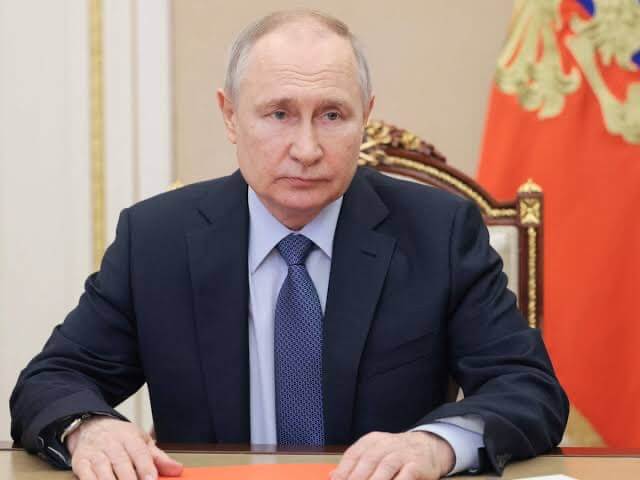The South African government granted diplomatic immunity to Russian President Vladimir Putin for the BRICS foreign ministers meeting in Cape Town later this week. The decision was taken as the International Criminal Court (ICC) issued an arrest order for Putin over war crimes committed by the Russian military in Ukraine.
South Africa Issues Diplomatic Immunity
According to a notice released by South Africa's Department of International Relations and Cooperation (Dirco), signed on May 19 and gazetted on Monday, Putin and his foreign equivalents will be awarded immunities and privileges under Section 6(1)(a) of the act. By the act, this immunity is granted to UN officials and experts, any specialised agency or organisation, and representatives of any state participating in an international conference or meeting in South Africa.
Section 6(1)(a) of the act sets out that immunities “are specifically provided for in the Convention on the Privileges and Immunities of the United Nations, 1946, or the Convention on the Privileges and Immunities of the specialised agencies, 1947, as the case may be, in respect of the participation in conferences and meetings.”
🟥WATCH🟥 ANC Secretary General Fikile Mbalula in conversation with Stephen Sackur on BBC Hard Talk .. According to Mbalula, the ANC would warmly welcome Russian President Vladimir Putin to South Africa as a member of the BRICS... “A head of state cannot just be arrested… pic.twitter.com/pDL4qPM2jt
— Central News (@centralnewsza) May 24, 2023
According to the UN Convention, immunities and privileges confer immunity from personal arrest or detention.
The department published a notification confirming that diplomatic immunity under the Diplomatic Immunities and Privileges Act will protect Russian officials participating in the two meetings. “It is hereby published for general information that the Minister of International Relations and Cooperation, in terms of section 6(2) of the Diplomatic Immunities and Privileges Act 2001, has recognised (the meetings), the department said.
According to Clayson Monyela, the Department of International Relations and Cooperation spokesperson, Pandor’s notification was “routine”, and such alerts were constantly sent out whenever similar international summits took place in South Africa.
BRICS Meeting
Dirco noted that the upcoming BRICS meeting in South Africa will be a protected event in August. The first is the BRICS Ministerial Meeting, scheduled in Cape Town on June 1 and 2, 2023, and the second is the 15th BRICS Summit, which will take place in Johannesburg from August 22 to 24, 2023.
The BRICS summit has become a very contentious political topic in South Africa, as Russian President Vladimir Putin is expected to participate.
South Africa grants immunity to President Putin from any impact due to ICC arrest warrants. Issues key order ahead of Brics Foreign & summit level meetings. pic.twitter.com/HBQ0kUgJ9f
— Sidhant Sibal (@sidhant) May 29, 2023
Putin’s Arrest Warrant by ICC
Putin’s scheduled participation at the conference has put South Africa in a bind, as the International Criminal Court (ICC) issued an arrest warrant for Putin in March for war crimes connected to the invasion of Ukraine. Since South Africa is a member of the ICC, it is obligated to arrest Putin if he is in the country.
Under pressure to find a solution, President Cyril Ramaphosa, speaking as president of the African National Congress, caused uproar and confusion in April after announcing that the ruling party would push the government to withdraw from the ICC – a statement that was quickly reversed.
Last month, Ramaphosa established an inter-ministerial committee to evaluate South Africa’s stance on the ICC. Paul Mashatile, the deputy president, will preside over the meeting.
The South African government has indicated that it is searching for a legal loophole allowing it to host Putin without violating the Rome Statute. Article 98 of the Rome Statute encompasses this loophole. It focuses on immunity waivers and state consent to the surrender of suspects for crimes investigated by the ICC. Article 98(2) outlines the circumstances for a state’s rejection to hand over a suspect to the ICC.
When the ICC urged South Africa to arrest and surrender then-Sudanese President Omar al-Bashir, the country attempted to use Article 98. However, the UN Security Council referred the Sudan case to the ICC, which claimed that Article 98 did not apply. In the opinion of Atilla Kisla, international justice cluster head at the Southern Africa Litigation Centre, Article 98 does not relieve South Africa of its obligation to arrest and surrender Putin if the ICC demands it.
South Africa is susceptible to an even more significant challenge under its own ICC Implementation Act, which explicitly states that sitting heads of state do not enjoy protection from prosecution - but without any condition like Article 98.
Even if South Africa withdraws from the ICC as intended, the country is still compelled to act on the arrest because of the guidelines, including a 12-month’ exit period’ (Article 127 of the Rome Statute).
Dr Hannah Woolaver, an expert in international law from the European Journal for International Law, posits that South Africa has limited options and the situation will be an important challenge for international law.

